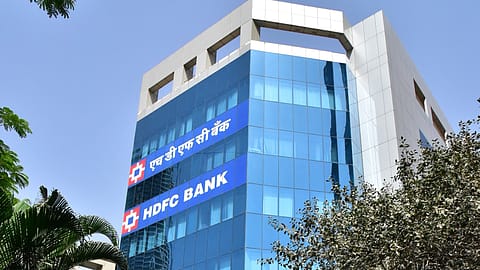HDFC Bank's big digital hiccup
The central bank orders the private bank to temporarily stop launches of digital business generating activities as well as sourcing of new credit card customers.

Service disruptions owing to outages is something HDFC Bank—which is India's largest private lender—seems to suffer annually. After a service outage in November 2018 and December 2019, the private bank suffered another one on the night of November 21 this year, one that lasted for nearly 12 hours.
These outages have now come under the notice of the Reserve Bank of India (RBI). As per HDFC Bank's December 3 stock exchange filing, RBI issued an order on December 2 taking cognizance of these recent outages, which included internet banking, mobile banking, the bank's payment utilities of over two years, and the recent November 21 outage.
The bank's exchange filing further added that, through the order, the central bank has advised the bank to temporarily halt all digital businesses under its yet-to-be-launched program, Digital 2.0. This includes sourcing of new credit card customers.
Additionally, the RBI order states that the bank’s board should examine the lapses and fix accountability for the same. “The above measures shall be considered for lifting upon satisfactory compliance with the major critical observations as identified by the RBI,” the filing read.
In terms of share price reaction on December 3, compared to HDFC Bank’s Wednesday closing price of ₹1,406.95 a share, Thursday’s low price of ₹1,374.25 is a decline of 2.2% over the previous day's close. After the close of trading, Sashidhar Jagdishan, HDFC Bank's chief executive officer, in a public message assured the bank’s customers that there is no reason to worry. “You can continue to transact with the bank without any concern,” he wrote.
While tendering an apology, Jagdishan affirmed that the bank is expected to maintain a very high standard of service quality and experience. “And sometimes, we have not been able to live up to your expectations,” he added.
According to an earlier Financial Express article, HDFC Bank had also faced queries from analysts and investors about the repeated outages. In January 2020, Jagdishan, who was the bank’s executive director at the time, had said the bank had become a “victim of its own success”.
Recommended Stories
“What we did not realise is with the kind of increase in businesses across liability, across assets, across payment products; and within payment products, multiple channels that we have been patronising, whether it is the cards, whether it’s the UPI volumes, I think we underestimated the growth in these volumes,” he had remarked.
The December 3 exchange filing pointed out that the bank had been taking conscious, concrete steps to remedy the recent outages on its digital banking channels. The filing assured its customers that the bank expected no impact of these supervisory actions upon its existing credit cards, digital banking channels, and other existing operations. “The bank believes that these measures will not materially impact its overall business,” the filing read.
While HDFC Bank may choose to underplay the regulatory action, the fact of the matter is that amongst total credit card point of sale (POS) transactions for September—which stood at ₹50,140 crore—HDFC Bank occupied the top slot with ₹15,273 crore, or over 31.3% of the total transaction value. In contrast, government-owned State Bank of India and HDFC Bank's private sector peer, ICICI Bank, had POS transaction values pegged at ₹9,915 crore and ₹7,466 crore for the same month, respectively. A point of sale transaction is the place, which can be both online as well as offline, where the consumer gives payment for goods or services he/she has consumed.
Moreover, as per RBI's September 2020 bankwise cards' data, HDFC Bank has outstanding credit cards in excess of 1.49 crore, which accounts for over 25.5% of over 5.86 crore outstanding credit cards across the country.
(INR CR)
For Jagdishan too, digital banking is the stated strategy for the bank’s future growth. “We will work with the experts and the regulator to fortify the identified areas for improvement,” Jagdishan wrote. “Internally, we are looking at this as an opportunity to further improve ourselves and emerge stronger.”
The latest move from RBI would compel HDFC Bank to bring over a permanent fix to the outage problems in order for smooth functioning and avoiding the regulator’s ire once again.